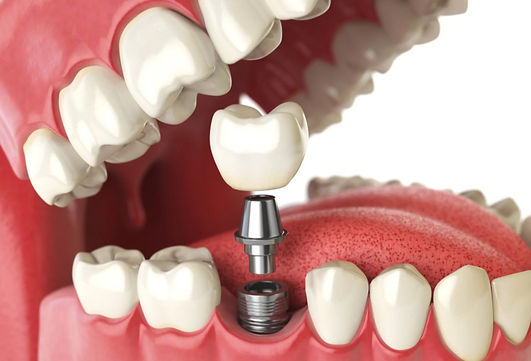DENTAL TREATMENTS IN
IRELIA HEALTH

What are Dental Implants?
Dental implants are artificial tooth roots that provide a permanent base for fixed, replacement teeth or bridges. Unlike dentures, which can slip or move, implants are anchored into the jawbone, offering a secure and durable solution for missing teeth. They look and function like natural teeth, allowing patients to smile, eat, and speak with confidence.
The Dental Implant Procedure
The dental implant procedure typically involves the following steps:
-
Initial Consultation: Your dentist will evaluate your oral health, including taking X-rays and possibly CT scans, to ensure you have enough bone to support the implant. If your bone density is insufficient, bone grafting may be recommended.
-
Placement of the Implant: The dental implant, usually made of titanium, is surgically placed into the jawbone beneath the gum line. Over the following months, the implant will fuse with the bone in a process called osseointegration.
-
Attaching the Abutment: Once the implant has fused with the bone, an abutment (a small connector piece) is attached to the implant. This serves as a base for the new tooth.
-
Placement of the Crown: After the gums heal, a custom-made dental crown is placed over the abutment, completing the restoration. The crown is designed to match the natural color and shape of your teeth, providing a seamless and aesthetically pleasing result.
Benefits of Dental Implants
-
Long-lasting: Dental implants are designed to last for many years, often a lifetime, with proper care.
-
Natural Look and Feel: Implants function and appear like natural teeth, offering improved comfort compared to other dental restorations like dentures.
-
Improved Function: Implants allow you to eat, speak, and smile confidently without worrying about shifting or discomfort.
-
Bone Preservation: Implants help preserve jawbone density by stimulating the bone, which prevents bone loss that often occurs when teeth are missing.
-
No Damage to Neighboring Teeth: Unlike bridges, which may require reshaping adjacent teeth, implants do not affect the surrounding healthy teeth.
Types of Dental Implants
Endosteal Implants:
-
The most common type, these are placed directly into the jawbone. They are typically made of titanium and may support a single tooth, a bridge, or a denture.
Subperiosteal Implants:
-
These are placed under the gum but on top of the jawbone. Subperiosteal implants are typically used for patients who do not have enough bone height in their jaw to support traditional implants.
All-on-4® Implants:
-
This system uses four implants to support a full arch of teeth, offering a solution for patients with extensive tooth loss.
Who is a Good Candidate for Dental Implants?
Dental implants are suitable for most patients who are in good general health and have sufficient bone density in the jaw. Ideal candidates should:
-
Have one or more missing teeth
-
Be free of gum disease
-
Have healthy oral tissues
-
Be committed to good oral hygiene and regular dental visits
Aftercare for Dental Implants
Proper aftercare is essential to ensure the long-term success of your dental implants. This includes:
-
Maintaining excellent oral hygiene by brushing and flossing regularly
-
Attending follow-up visits with your dentist to monitor the healing process
-
Avoiding smoking, as it can interfere with healing
-
Eating soft foods for the first few days after surgery to allow the gums to heal
Healing Timeline for Implants and Zirconium Crowns
After a dental implant is placed, a healing period is required to ensure the implant properly integrates with the jawbone—a process called osseointegration. This typically takes around 3 to 4 months, depending on the patient’s bone quality and overall health. Once the implant is securely fused, zirconium crowns can be placed to complete the restoration and achieve a natural-looking, durable result.
However, in more complex cases where sinus lifting, bone grafting, or membrane placement is performed due to insufficient bone volume—especially in the upper jaw—the healing period is longer. In such situations, we recommend waiting approximately 6 months before placing the zirconium crowns to allow the bone to heal and stabilize properly.
This timeline ensures the long-term success of the implant and provides a strong foundation for the final prosthetic. Your personalized treatment plan and follow-up schedule will be discussed in detail with your dental specialist during your consultation.
Implant Brands that we use for our patients





Contact Us






